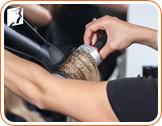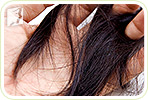
Menopause is an inevitable part of life for women. Hair loss, on the other hand, does not necessarily have to be. Of course, genetic predisposition, medical complications, and trauma may cause or exacerbate cases of hair loss, but there are some measures you can take to prevent hair loss and keep your beloved tresses as long as possible.
A major cause of hair loss during menopause is the imbalance of the hormones estrogen and progesterone in the body. There are some tips you can follow to prevent hair loss, but none of them are a 100% guarantee. Hair loss is not always preventable or reversible, so it is important to find a way to be comfortable with the way you look, no matter how much hair you have.
Address the Stress in Your Life

Stress is one of the major aggravators of hormone levels. Try using meditation, exercise, journaling, or drawing to deal with your stress. This will not only help you have healthy hair, but also improve your overall health.
Birth Control Pills Affect Your Hormones
Birth control empowers women to make their own decisions about the sexual and reproductive aspects of their lives. However, if you are genetically predisposed to hair loss, it is generally recommended to use a birth control pill with a low androgen index. Using non-hormonal alternatives such as condoms may also work for you. Talk to your doctor if you feel like your birth control may be increasing your risk for hair loss.
Make Sure to Get Your Vitamins

Eating a balanced and healthy diet should allow you to get all the vitamins and nutrients that you need. An incomplete diet may instigate hair loss or lead to unhealthy, thin, or dull hair.
Drink Water
In order to maintain overall wellness, you need to be well hydrated. Drinking water helps keep the cells in your body hydrated, and this extends to your scalp and hair follicles.
Don't Wear Weaves or Extensions
Excess yanking and tugging on hair from hair weaves and hair extensions can cause premature hair loss. Ponytails or braids that are too tight can also tug and rip out hair.
Keep Styling to a Minimum

Hair dryers, curling irons, and other high-heat treatments dry out and weaken hair, leaving it at greater risk of breakage. Making sure your hair and scalp are healthy overall can help to prevent hair loss.
Go Natural
Hair dye and perms use harsh chemicals. If they are left on too long, the scalp can suffer damage and have trouble with hair growth.
Exercise
Relieve stress and regulate your circulation at the same time. Regular exercise is imperative for overall health.
Embrace How You Look
Hair loss is not always preventable, so you will help yourself if you can accept and embrace who you are and how you look. Society tends to frequently judge women based on their physical appearance, but you should not let other people's ignorance and biases impact how you see yourself. You do not need hair or a specific hairstyle in order to be beautiful.
Recommendation
Taking care of your body now will help you look and feel healthier later on in life. Menopause is a life stage, not a disease, and it shouldn't be something that women fear. Check out the following link for more information on hair loss treatments.
Sources
- Mayo Clinic. (2015). Hair Loss. Retrieved from www.mayoclinic.com.
- Dr. McNair, Trisha.(n.d). "Hair Loss". BBC Health.Retrieved from www.bbc.co.uk.
- The American Hair Loss Association.(n.d)."Womens Hair Loss".Retrieved from www.americanhairloss.org.



